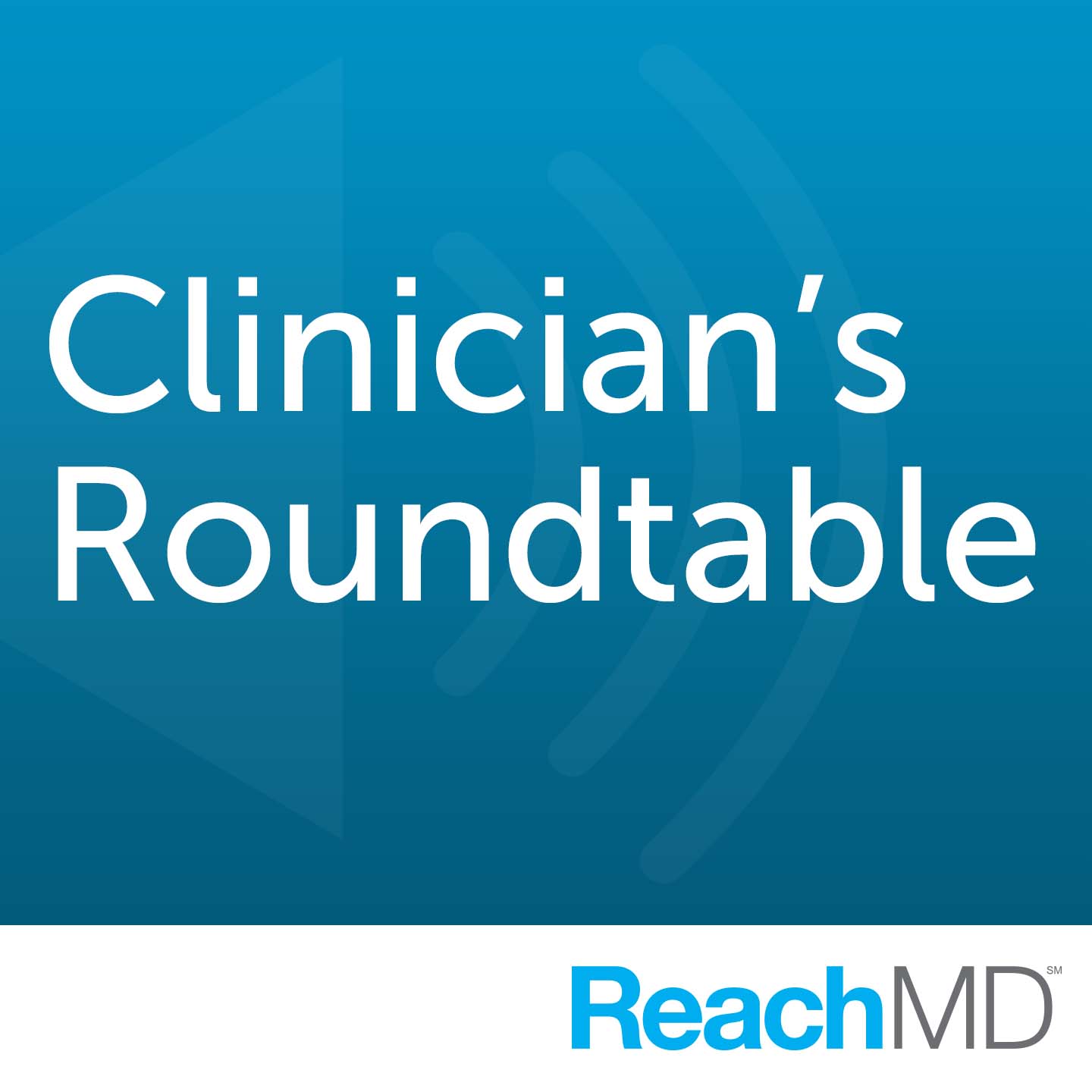

Clinician's Roundtable
ReachMD
Tune in to interviews with the top thought leaders in medicine exploring the clinical and professional issues that are foremost in the minds of the medical community. Join us at the Clinician's Roundtable for discussions on a vast range of topics that every medical professional should know about.
Episodes
Mentioned books

May 27, 2008 • 0sec
Pediatric Otitis Media: To Treat or Not To Treat?
Host: Bill Rutenberg, MD
Guest: Richard Rosenfeld, MD
Dr. Richard Rosenfeld, professor of otolaryngology at the State University of New York Health Sciences Center, joins host Dr. Bill Rutenberg for an insightful discussion of the current care guidelines for pediatric otitis media. Dr. Rosenfeld addresses difficulty and necessity of accurate diagnosis in order to safely apply "watchful waiting" as first-line treatment. What do you do if the patient doesn't get better?

May 23, 2008 • 0sec
Detecting Parathyroid Disease
Host: Maurice Pickard, MD
Guest: Mira Milas, MD
There are many new techniques to evaluate patients with thyroid and parathyroid disease. Dr. Mira Milas, associate professor at the Institute of Surgery, Endocrinology and Metabolism Institute at Cleveland Clinic Lerner College of Medicine, speaks about the use of ultrasound in thyroid disease detection. She also updates host Dr. Maurice Pickard on the development of a new test, TSHrmRNA, to augment intermediate FNA as well as to show if there is residual disease or recurrence. They also discuss osteoporosis found in some men with parathyroid disease.

May 23, 2008 • 0sec
New Tools for Successful Thyroid and Parathyroid Surgery
Host: Maurice Pickard, MD
Guest: Mira Milas, MD
Dr. Mira Milas, associate professor of surgery at the Cleveland Clinic Lerner College of Medicine, discusses with host Dr. Maurie Pickard the expanding field of endocrine surgery and how ultrasound and fine needle aspirations have led to successful pre-operative evolutions. Intraoperative parathyroid procedures can help avoid reoperations. In addition, we learn that decisions to operate on asymptomatic patients with hyperparathyroidism need to be seriously considered.

May 22, 2008 • 0sec
Guiding a Patient With Huntington's Disease
Host: Maurice Pickard, MD
Guest: Robert Klitzman, MD
The current research in Huntington's disease still leaves us with more questions than answers. We know the causative gene, identified the proteins involved, and can postulate the mechanisms. Yet despite the universal outcome from this disease, patients may still live much of their adult lives productively, leading to added dfficulty in making life choices. Dr. Robert Klitzman, Associate Professor of Clinical Psychology at Columbia University College of Physicians and Surgeons, joins host Dr. Maurie Pickard on the subject of counseling patients with Huntington's Disease through life's milestones.

May 22, 2008 • 0sec
Toward Better Disclosures of Fatal Adult Onset Inherited Disease
Host: Maurice Pickard, MD
Guest: Robert Klitzman, MD
Dr. Robert Klitzman, Associate Professor of Clinical Psychology at Columbia speaks about the need for more genetic counselors to help with families of Huntington's disease, breast cancer, alpha-1 antitrypsin deficiency and familial polyposis. People can order genetic testing and disease ancestry search directly on the internet. Many physicians have not been able to keep up with developments of the genome but will be asked to be knowledgeable about this exploding field. Dr. Maurie Pickard hosts.

May 22, 2008 • 0sec
Helping Patients Deal with the Psychosocial Issues of Huntington's Disease
Host: Maurice Pickard, MD
Guest: Robert Klitzman, MD
Dr. Robert Klitzman, associate professor of clinical psychology at Columbia University, discusses how to prepare patients and their families to deal with the complex issues that arise in families that have inherited Huntington's disease. Join host Dr. Maurice Pickard for this important discussion.

May 21, 2008 • 0sec
Concierge Medicine: Doctors Working for Patients
Host: Larry Kaskel, MD
Guest: Marcy Zwelling, MD
In 2004 Dr. Zwelling-Aamot dramatically reduced the size of her practice, adopting the concierge model in order to provide a higher level of access and attention to a smaller number of patients. Host Dr. Larry Kaskel speaks with Dr. Aamot about the failings of the current healthcare system in the United States and the decision to convert her practice into a concierge model.

May 21, 2008 • 0sec
The Pioneer of Concierge Medicine
Host: Larry Kaskel, MD
Guest: Steven Knope, MD
One of the leading pioneers and innovators in concierge medicine, Dr. Steven Knope discusses how the concierge medicine practice model is a solution to the failing health care system in the United States. Dr. Knope opened one of the nation's first concierge medical practices and discusses why the arrangement is the perfect resource for practitioners and patients alike. Dr. Knope also discusses some of the key steps necessary for converting a practice to a concierge model, outlined in his book, Concierge Medicine A New System to Get the Best Healthcare.

May 21, 2008 • 0sec
The Real Story on Stents: A Bright Future?
Host: Larry Kaskel, MD
Guest: Renu Virmani, MD
Drug-eluting stents or bare metal stents: can pathology research give us a clearer picture? An internationally recognized cardiopathologist, Dr. Renu Virmani, sorts through what we know and what don’t know about drug-eluting stents with host Dr. Larry Kaskel. According to Dr. Virmani, the long-term outlook for stents is quite good, with key improvements in polymers and advances that afford us better quantitative control over the drugs administered via stents.

May 21, 2008 • 0sec
The Cardiopathology of Plaque
Host: Larry Kaskel, MD
Guest: Renu Virmani, MD
What does pathological data tell us about vulnerable plaque and how can we detect it before it’s too late? Join internationally recognized cardio pathologist, Dr. Renu Virmani talking about what she has discovered in the path lab about patients who have died from plaque rupture. She discusses with Dr. Kaskel the variations in soft and hard plaque, the role of the vaso vasorum in disease and whether or not non-invasive techniques can lead to a diagnosis about plaque.


